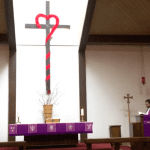All pastors, church leaders, and their congregations should take advantage of this free resource on what churches need to do in this coronavirus epidemic: Witness in the Plague: A Simple Tip Sheet for Churches to Manage Infectious Diseases Like COVID-19.
The 18-page document gives scientifically-informed guidance on how churches can minimize the risk of transmitting the virus. It also explains how churches can continue to offer Word and Sacrament ministry and give pastoral care, whether corporate worship services are shut down or whether they continue. Stone also emphasizes Christian witness and how Christians can serve their communities.
The booklet was put together by Lyman Stone, a Christian scholar whose work and citations to his work I am seeing more and more. He is a social scientist with the Institute for Family Studies and is the Chief Information Officer for the consulting firm Demographic Intelligence, under whose auspices he has extensive experience analyzing infectious diseases and mortality rates for medical companies.
Moreover, he is a lay missionary for the Lutheran Church Missouri Synod in Hong Kong, where he has been working with churches dealing with COVID-19 and, previously, with the even more deadly SARS epidemic of a few years ago.
Not only does the document include clear information about the disease and a strong Christian perspective throughout, it gives a wealth of highly practical advice, much of which I had never heard before.
For example, there is a section entitled “How Should We Manage Our Physical Structure” with advice like this:
3. Run humidifiers, air purifiers, and air conditioning. Better air quality and higher humidity can reduce the severity of symptoms like coughing, which reduces spread, and can also reduce how long disease particles hang in the air. Very dry air causes water droplets to aerosolize quickly, making infection risks worse.
4. Maximize sunlight. There is some research that suggests sunlight and UV radiation can help kill germs. Open the blinds and get light in as many rooms as possible. Portable UV lamps might help as well, but there’s no substitute for actually cleaning surfaces. . . .
6. Seal off low-usage parts of the building. Keeping your space clear of infection is easier if you have less space to clean. So consider just putting up tape or other barriers to limit access to unnecessary parts of the building.
To the question, “should we abstain from Communion?” Stone answers with a big 60-point-font “NO.” But safeguards need to be put into place. In the common cup, doesn’t the alcohol in the wine and the silver surface inhibit the transmission of germs? Yes, he says, but that applies mainly to bacteria, not so much for viruses. The alcohol level would need to be over 50% to disinfect against viruses, far beyond that of wine (which is, he stresses, far more sanitary than grape juice). So individual cups are in order. He also gives guidance for administering the bread–not the celebrant placing it on the tongue of the recipients, nor in a pile of many pieces for people to rummage through. He says, “The lowest-risk strategy for communion is for small groups to approach a designated place to receive communion, and there take the bread in individual pieces and the wine in individual cups.”
Stone gives extensive guidelines for churches that are continuing to worship corporately. But he also offers first-rate ideas for continuing to offer Word and Sacrament ministry even when prudence or the governing authorities restrict meetings in large groups. And not just by online services. He says,
The physical means of grace through communion and baptism, and the great comfort of person-to-person community at church, are vitally important. As long as a non-infected congregation and leader exist with access to a space where infection risk can be managed, church members should take every possible measure to maintain regular assembly together. Do not neglect the fellowship of believers.
How can that be done? Here are his suggestions:
- “Phased services.” Assign specific church member families times when they may come to church and receive communion. Only invite a limited number of families at a time. Continue to impose strict hygienic and social distancing measures during these events. Household schedules are much more flexible now than they usually are; use this to your advantage. Plan Monday services. Tuesday services. Every-day services. Inform members of their “group,” which might give them 2 or 3 service options to attend throughout the week.
- “Multi-siting.” If you have multiple pastors or deacons who can perform the functions necessary for your church community to gather in an appropriate way, consider setting up multiple sites. One group could meet in the church, one in a nearby park, and a third in a church member’s currently-closed business, for example. Even in many traditions with strong norms around pastoral leadership, deacons can provide communion which has been consecrated by a pastor, and can read a sermon written by a pastor.
- “Home groups.” These can be coordinated with parent-shares described below. Set up groups of families who will gather and pray together. Your pastor can establish a scheduled rotation, visiting each home group and providing communion as appropriate.
Again, I cannot emphasize enough how helpful this resource is. If you are a pastor, read it. If you are not a pastor, show it to your pastor. You can access this booklet, which is a simple Google Document and absolutely free, at this site.
Image by Gerd Altmann from Pixabay













